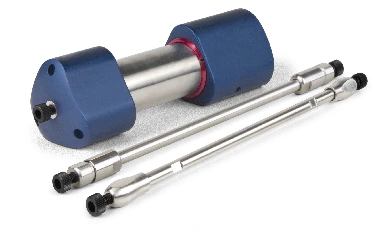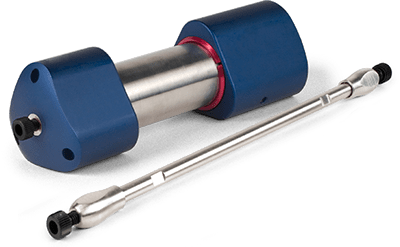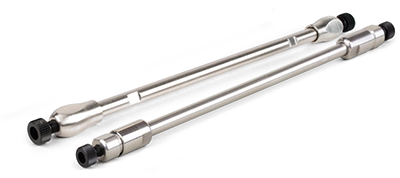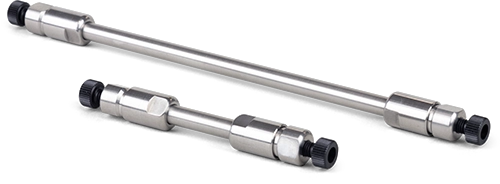- The HPLC mobile phase, typically a liquid solvent or a mixture of solvents, carries the analyte through the column.
- It plays a crucial role in the separation process by interacting with the stationary phase and the analytes.
- The choice of mobile phase composition, including solvent type, pH, and buffer concentration, influences the selectivity, resolution, and efficiency of the separation.
- Common mobile phase solvents include water, acetonitrile, methanol, and various buffers, depending on the analyte's properties and separation requirements.
- Optimization of the mobile phase column chromatography is essential for achieving optimal chromatographic performance in HPLC analysis.

High Performance Liquid Chromatography (HPLC)
What Is HPLC?
High-performance liquid chromatography is a powerful analytical technique used to separate, identify, and quantify each component in a mixture. It is widely employed in various fields, such as pharmaceuticals, environmental monitoring, food and beverage analysis, and chemical research.
HPLC operates by passing a liquid sample through a column packed with solid adsorbent material under high pressure, enabling the separation of compounds based on their different interactions with the stationary phase.
Common LC Column Formats
Shop by HPLC Column Brands

HPLC Column Types
What Are HPLC Columns?
HPLC columns are critical components in the HPLC system, responsible for the actual separation of the sample components. These columns are typically made of stainless steel and packed with tiny, uniform particles known as the stationary phase. The choice of stationary phase material and the column's dimensions (length, diameter, and particle size) significantly influence the separation process and the efficiency of the analysis. Coupled with sensitive detector systems, HPLC has become a widely employed method for confirming drug identity, providing quantitative results, and monitoring therapeutic progress in disease management.
Basic Principles of HPLC (High-Performance Liquid Chromatography)
High-pressure liquid chromatography (HPLC) is a technique that uses a solid stationary phase and a liquid mobile phase (e.g., acetonitrile, methanol, phosphate buffer, etc.) to separate components in a mixture. In the HPLC setup, the stationary phase is often housed in specialized columns, commonly referred to as HPLC columns, which are typically constructed from high-quality stainless steel. Liquid chromatography columns in HPLC are designed to withstand the high pressures required for efficient separation. Chemical interactions between the stationary phase and the chemical composition of the components in the mixture result in the components traveling at different speeds in the HPLC column and separating or eluting at different times from the column stationary phase.

How to Choose the Correct HPLC Column?
Choosing the correct HPLC column is essential for achieving optimal separation and analysis of compounds. Several factors need to be considered when selecting a column for HPLC:
- Sample Properties: Understand the properties of the sample being analyzed, such as polarity, size, and chemical nature. Match these characteristics with the appropriate stationary phase chemistry and column type.
- Analyte Stability: Consider the stability of the analytes during the separation process. Choose column and mobile phase conditions that minimize degradation or interaction with the stationary phase.
- Separation Objective: Determine the specific compounds or classes of compounds you need to separate and analyze. Select a column type that provides the required selectivity, resolution, and efficiency for your application.
- Column Dimensions: Consider the dimensions of the column, including length, diameter, and particle size. Longer columns with smaller particle sizes typically offer higher resolution but may require longer analysis times.
- Mobile Phase Compatibility: Ensure compatibility between the mobile phase and stationary phase chemistry to prevent interactions that could affect separation efficiency and column performance.
- Sample Matrix: Consider the composition of the sample matrix and potential interferences. Choose a column that can effectively separate the target analytes from matrix components.
- Budget and Resources: Consider practical factors such as budget constraints, availability of columns, and equipment compatibility.

How do High-Performance Liquid Chromatography (HPLC) Columns Work?
Columns for HPLC are key components that facilitate the separation of analytes in chromatographic analysis. These analytical columns in HPLC contain a stationary phase, which interacts with the sample components as they pass through the column under high pressure. Choosing the column type and conditions is crucial for achieving efficient and selective separation of analytes in HPLC analysis.
Phases of HPLC
Mobile Phase
Stationary Phase
- The stationary phase is a solid or liquid material packed inside the HPLC column, where the analytes are separated.
- It interacts with the analytes based on differences in polarity, size, charge, and other chemical properties.
- The choice of stationary phase chemistry, such as reversed-phase, normal-phase, ion exchange, or affinity chromatography, determines the selectivity of the separation.
- Stationary phases can be made of silica-based materials, polymers, or other specialty materials, depending on the application.
Particle Types
Fully Porous Particles
Fully porous particles are the traditional particles used in HPLC columns. These particles have pores that allow the mobile phase and analytes to diffuse throughout the entire particle. This leads to a high surface area, enabling good separation efficiency. Fully porous particles are versatile and are often applied in a wide range of analytical applications, particularly when high resolution is required.
Superficially Porous Particles (Core-Shell Particles)
Superficially porous particles, also known as core-shell particles, consist of a solid, non-porous core surrounded by a thin, porous layer. This unique design reduces the diffusion path of analytes, leading to faster separations with high efficiency, often comparable to sub-2 micron particles but with the advantage of lower back pressure. These particles are ideal for applications requiring rapid analysis without compromising the resolution.
Monolithic Particles
Monolithic particles are made from a continuous porous rod rather than packed particles. This structure offers high permeability, which allows for faster flow rates with lower back pressure. Monolithic columns are known for their robustness and are particularly effective in handling complex matrices. They are well-suited for high-speed separations and are often used in bioanalytical applications, such as the analysis of proteins and peptides.
Sub-2 Micron Particles
Sub-2-micron particles are extremely small, providing a very high surface area that results in high efficiency during separations. These particles are commonly used in Ultra-High Performance Liquid Chromatography (UHPLC), a technique that operates at higher pressures to achieve faster and more efficient separations. Sub-2-micron particles are ideal when the highest possible resolution and speed are required, particularly in complex separations involving closely related compounds.
Silica-Based Particles
Silica-based particles are the most commonly used stationary phases in HPLC due to their mechanical strength, chemical stability, and compatibility with various modifications, such as bonded phases. These particles can be fully porous or superficially porous and are available in various particle sizes. Silica-based particles are used in a wide range of HPLC applications where chemical stability and mechanical strength are essential.

















